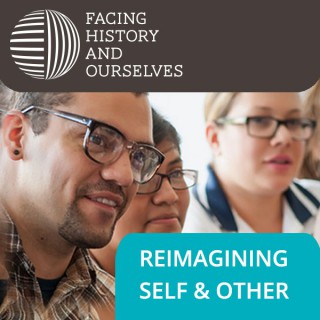
Reimagining Self and Other: A Facing History Day of Learning
Follow Reimagining Self and Other: A Facing History Day of LearningFacing History and Ourselves is an international educational and professional development organization whose mission is to engage students of diverse backgrounds in an examination of racism, prejudice, and antisemitism in order to promote the development of a more humane and informed citizenry. On M…
- Apr 16, 2014 LATEST EPISODE
- infrequent NEW EPISODES
- 20m AVG DURATION
- 7 EPISODES
Latest episodes from Reimagining Self and Other: A Facing History Day of Learning

David Jones: Genetic (Mis)understandings- The Modern Science of Human Difference
In this talk, Jones traces an extensive historical overview of the theories behind human difference, from ancient Greeks to the eugenics movement to modern day scientists, in order to better inform how we answer the question: If genetics shows how we are all different, does it matter?

In this talk, Minow, Dean of the Harvard Law School, explains how the law can be used to reinforce social prejudices and create power imbalances, but can also be used as a resource to challenge those patterns. Minow uses examples of current and past court cases brought in countries around the world, such as Slovakia, to illustrate that the law can reflect legacies of inequality, but can also be a powerful tool in helping to fix these inequities.

Plummer discusses how humans must navigate a variety of obstacles, including basic scientific processes such as our biological instinct of fight or flight, when interacting in a diverse world. She also talks about how we establish our own racial identities and the difficulties we encounter in this process, and how we can act to bring about a truly post-racial society.

In this talk, Kandola explains the different types of biases we face in society today, using examples from studies that he and other scholars have conducted. He goes on to suggest ways in which individuals can work to minimize the impact of the biases that they already possess.

Inzlicht illustrates that stereotypes and the idea of stereotype threat have very real consequences in terms of achievement, behavior, and perhaps even health. He explains studies that both he and other scholars in the field have conducted that show how stereotypes and stereotype threat affect those who experience them, even showing how these experiences can affect a person’s ability to restrain his or her impulses and to exercise self control.

Appiah describes the three basic principles of ethics and applies them to personal and group identities, illustrating how ethics can help shape the way we think about and approach diverse identities. While he acknowledges that people have used identity to place limits and negative associations onto a group of people, Appiah also demonstrates how we can think about identities in a positive way.

Casanova discusses the foundational myth of European secularism, detailing the problems that arise with European societies classifying themselves as secular. He uses examples from throughout history, such as the expulsion of Jews from Spain in 1492, to illustrate the idea that we must rethink the ways in which European societies have become secular and homogeneous.








